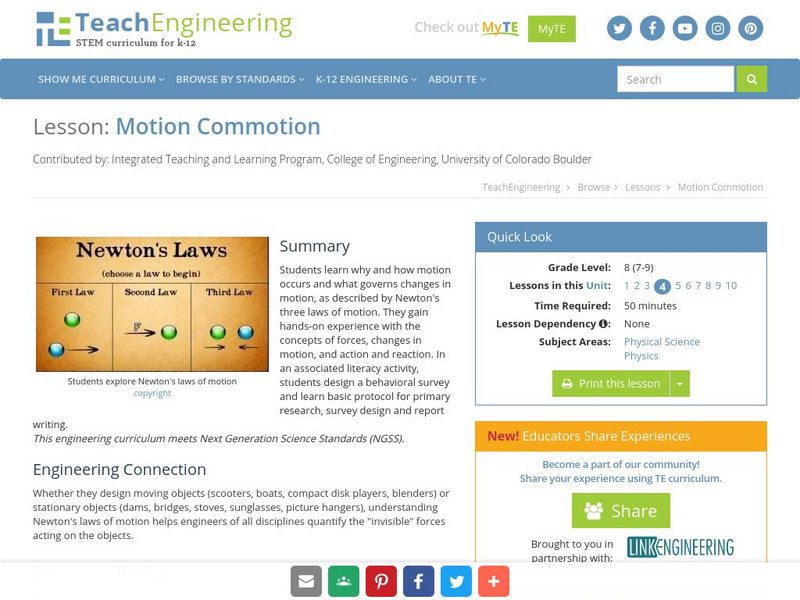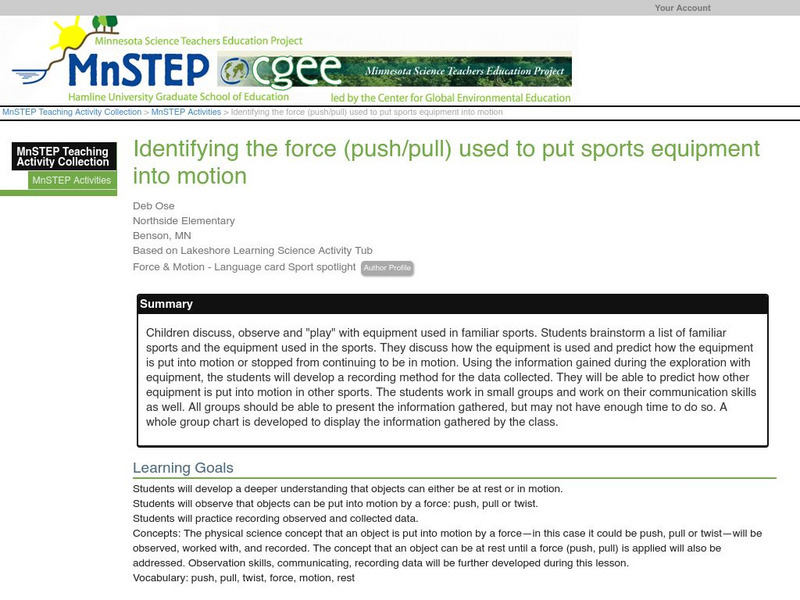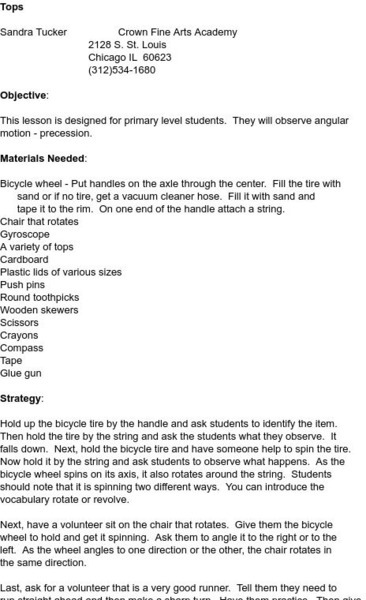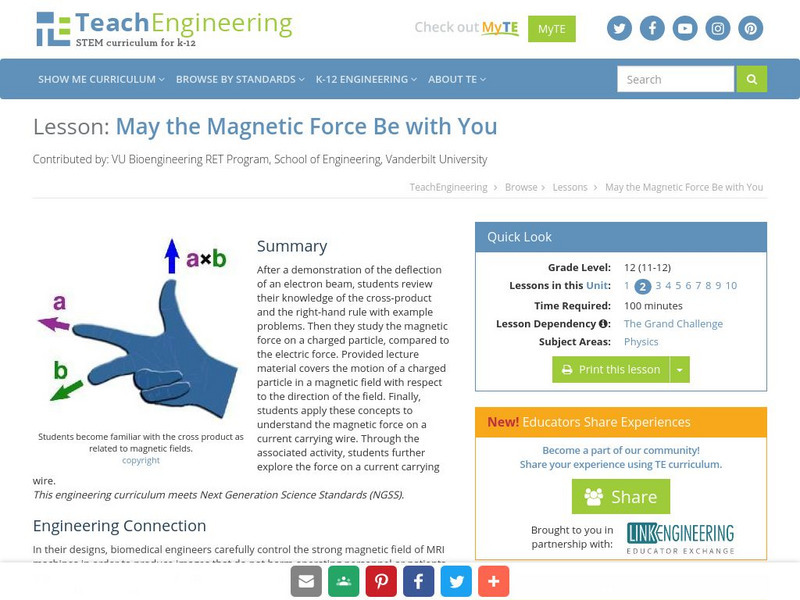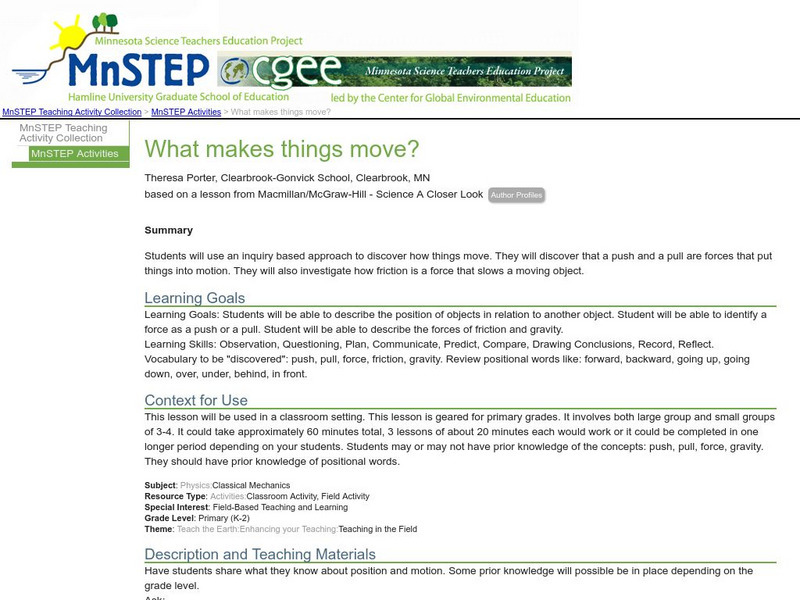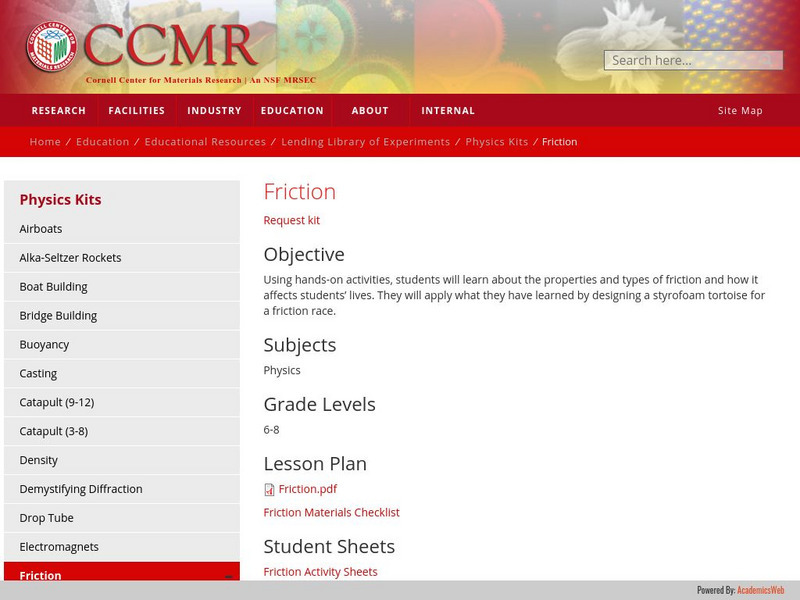TeachEngineering
Teach Engineering: Motion Commotion
Students learn why and how motion occurs and what governs changes in motion, as described by Newton's three laws of motion. They gain hands-on experience with the concepts of forces, changes in motion, and action and reaction. In an...
Other
Bscs: Forces Lesson 1: What Makes Something Start to Move?
Through hands-on activities, this lesson will show students that a force is a push or a pull and forces cause changes in motion. Included are a minute-by-minute lesson plan, activities, and teacher discussion points and questions.
Science Education Resource Center at Carleton College
Serc: Identifying the Force Used to Put Sports Equipment Into Motion
Children discuss, observe, and play with equipment used in familiar sports, and then brainstorm a list of familiar sports and the equipment used in the sports. They discuss how the equipment is used, and predict how it is put into motion...
Texas Instruments
Texas Instruments: Classroom Activities: Parachuting
This activity explores a parachutist and her position, velocity and acceleration. Graphing and calculating these functions will be required.
Science Education Resource Center at Carleton College
Serc: Investigating Projectile Motion: Predicting Point of Impact
Students discuss forces acting on objects in a trajectory motion. They review notes, study equations, solve projectile motion problems, and determine experimentally the impact point of a ball in projectile motion.
Science Education Resource Center at Carleton College
Serc: Newton's Second Law: How Does Acceleration Change With Varying Forces?
In this lab activity, students investigate the effects of changing force on the acceleration of a lab cart testing Newton's Second Law of Motion. They will use distance and time to calculate velocity and create a graph representing their...
Science Education Resource Center at Carleton College
Serc: Newton's Second: Having a Ball With Motion
Students will create a gravity ball launcher to demonstrate their understanding of mass, force, momentum, and motion. The students will use critical thinking, measurement, and observation and analysis of data to make changes and improve...
Science Education Resource Center at Carleton College
Serc: Inertia: An Object in Motion Will Tend to Stay in Motion
This activity is a take off of Galileo's experiment with the inclined planes to show that an object in motion would stay in a straight line motion if no outside forces acted were acting on it. In this version, students will roll a ball...
Science Education Resource Center at Carleton College
Serc: Centripetal Force Activity
In this physics activity, students will simulate a race car on a circular track. Velocity, acceleration, and force vectors will be analyzed at various places along the track. As the students progress in the activity, prompts for student...
Science Education Resource Center at Carleton College
Serc: Visualizing Molecules in Motion
In this lab, students will explore the motion of molecules, the forces involved in making them move and predict the level of interaction that molecules can have in order to better understand chemical reactions.
Science Education Resource Center at Carleton College
Serc: Investigating Projectile Motion: Creating a Catapult
This lesson is for 9th grade physical science students. It begins with an inquiry-based lesson using a projectile motion computer simulation. It culminates with students building a catapult; applying and connecting science knowledge from...
Utah Education Network
Uen: Rock a Bye Pendulum
Activity uses scientific process to explore the effects of force on an object in motion.
Science and Mathematics Initiative for Learning Enhancement (SMILE)
Smile: Lab Activity: Tops
The Illinois Institute of Technology provides a lab activity on precession and spinning tops. Designed for primary grades, but easily adapted for any level. Includes directions and assessment ideas.
TeachEngineering
Teach Engineering: May the Magnetic Force Be With You
This lesson begins with a demonstration of the deflection of an electron beam. Students then review their knowledge of the cross product and the right hand rule with sample problems. After which, students study the magnetic force on a...
Science Education Resource Center at Carleton College
Serc: Mn Step: What Makes Things Move?
In this activity, young scholars will learn about push and pull forces that make things move. They will also practice using position words to describe location. To learn about forces, they will move objects, observe the movement of...
Utah STEM Foundation
Utah Stem Action Center: Push or Pull?
This super simple activity for kindergarten-age young scholars requires no materials and can be done inside or outside, or both and explores forces and motion.
Science Education Resource Center at Carleton College
Serc: Investigating Newton's 3rd Law: Coin Flick
In this elementary physics investigation, students explore Newton's 3rd Law of Motion: To every action there is an equal & opposite reaction. Pairs of students will line up 5 pennies, (touching each other), between 2 rulers. The row...
TeachEngineering
Teach Engineering: Projectile Magic
Students watch video clips from October Sky and Harry Potter and the Sorcerer's Stone to learn about projectile motion. They explore the relationships between displacement, velocity and acceleration and calculate simple projectile...
Science and Mathematics Initiative for Learning Enhancement (SMILE)
Smile: Third Law of Motion
This Illinois Institute of Technology site provides a teacher lesson plan for an activity in which students use spring balances and carts to investigate the action-reaction relationship for any given force. Includes directions, materials...
Alabama Learning Exchange
Alex: Experiencing Newton's Laws of Motion
This lesson will approach the study of Newton's 3 Laws of Motion using McGraw-Hill Science textbook Unit F. The students will be given an overview of the laws and vocabulary words to study. After introducing and explaining the concept of...
Alabama Learning Exchange
Alex: Pendulums Swing Into Motion
This lesson will allow students in groups to describe the relationship between energy, work, and force through the use of pendulums. The results will be reported through a graphing activity as well as a paragraph written and printed on...
Cornell University
Cornell University: Cornell Center for Materials Research: Friction
A collection of experiments where students can learn about how friction works and affects the physical world. At the end, students design a tortoise to win by slowing it down using friction. Lesson includes explanation of the concept of...
PBS
Wgbh: Peep and the Big Wide World: Introduce Ramps
An introductory activity where learners discover the way things roll and slide down ramps and hills.
Science Education Resource Center at Carleton College
Serc: Egg Drop
In this physics lab, students build a container to safely deliver two eggs from the top of the school. Students calculate average velocity, acceleration, momentum, and the amount of force as it hits the ground. If their egg breaks, they...
